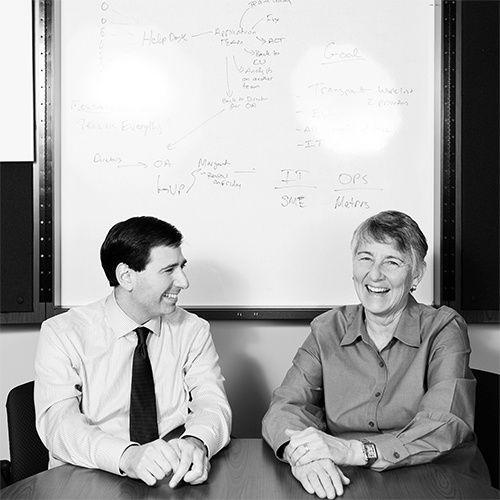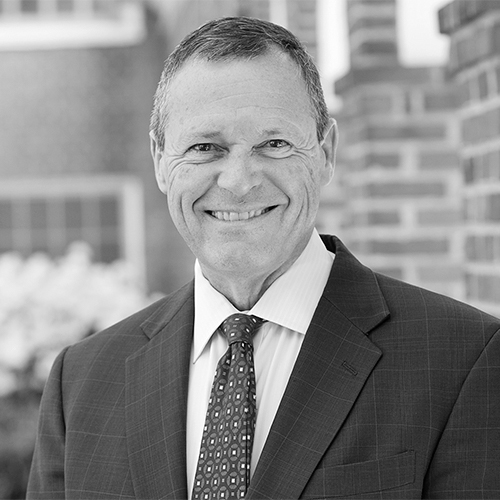Anthony S. Slonim’s mother used to come home with medical textbooks for him when he was in elementary school. The young Slonim would sit in his room for hours on end to read them, learning about the body and how it functioned. This boyhood interest would propel him across whole sectors of healthcare, from technician to nurse to physician to public-health professional.
At age thirty-eight, Slonim was diagnosed with oral cancer. Though he had learned about healthcare from the other side of the bed by that point as a physician, it was yet another critical perspective for him. “There are some periods in your illness when, despite all of the people around the table who care about you, it’s a really lonely experience,” Slonim says. “You have to dig within your own soul, your own mind, to be able to come out at the other end and be strong again. I think that’s an important piece we never realize as physicians.”
One time at the hospital, Slonim experienced a complication from a procedure late at night, yet still received immediate, personalized medical attention. The experience showed him how professionals treat patients and helped him to better understand and tailor patient care. “What worries and concerns you as a patient aren’t the same things that your healthcare team is worried about,” he says. “And you often have to remind them what’s important to you as you’re going through your illness and treatment.”
“Healthcare providers need to realize that they are in a very esteemed position to be able to deliver for patients and families when they feel the most vulnerable.”
Today, as president and CEO for the northern Nevada-based Renown Health, Slonim uses his experiences as a physician and cancer survivor to pivot the company towards better healthcare, population-health management, and a healthier community.
As a direct result of his dual experience as a care provider and as an individual who was diagnosed with cancer, Slonim encourages providers to always understand their position and their value to patients and families.
“Healthcare providers need to realize that they are in a very esteemed position to be able to deliver for patients and families when they feel the most vulnerable,” he says. “That transcends educational, experiential, cultural, or ethnic backgrounds. You are the person these people hope will cure them. You have to wield that power in a very sensitive manner.”
Slonim contends that physicians must be careful to not influence patient decisions. At Renown, he believes in the power of teamwork to assist physicians in providing first-rate care. Education and training are important, but so is hiring the right people. They must know how to work in a team environment, stand up for the people they serve, and always have a backup strategy or someone to reach out to if things don’t go according to plan.“That creates a culture of safety,” he says.
From a medical perspective, Slonim’s culture of safety stems from his own educational and clinical background; he’s also worked as a nurse and as an intensive care specialist. For Slonim, clinical representation on the senior management team is essential. “Anyone who has ever cared for a patient has a lens into how those patients might want to be treated,” he says. “It doesn’t mean that a nonclinical person can’t have an impact, but having a clinical background certainly does augment our strategic thinking around patient care.”
Slonim combined his experiences and knowledge from the ICU with his background in public health to create the Child Health Institute, which strives to be one of a handful of pediatric ACOs in the nation. Because only 15 percent of the region’s 100,000 children will ever end up in hospital due to chronic illness or disease, Renown wanted to create a collaborative organization that combats issues compromising the health of all children.
“We know that we’ve got 300 homeless children on the street,” Slonim says. “This collaborative is going to fix that in two years. We know that we have a number of kids in the adolescent-age range who are attempting suicide, and we’re going to figure out how we can solve that problem together.”
The Institute is one way Renown is partnering with other local organizations to address the needs of the community, and it’s just one of the programs Renown is developing to better population-health management.
Recently, the company created a team dedicated to population health. The team went live in April and ensures highly coordinated care so that patients don’t have to worry about their treatment after being discharged from the hospital.
It’s also invested in growing the area’s number of physicians and advanced practitioners, partnering with the University of Nevada–Reno School of Medicine to create a four-year campus for medical students in Reno so that they no longer have to travel elsewhere for clinical training.
Another initiative Renown is supporting is the Truckee Meadows Healthy Communities program, a local collaborative of key stakeholders who seek to improve the health of their community.
“When you’re living in poverty, how can you be expected to live healthy if you aren’t sure where your next meal is coming from?” Slonim asks rhetorically. “Our community’s health is impacted when the mother of a little boy down the road is afraid to go outside of her home to get his immunizations because of the high crime rates in their community.”
The 89502 Project, one initiative of this program, focuses on the most impoverished zip code, identifies its residents’ specific health needs, and works with them directly to determine appropriate solutions for their community.
It all comes back to the community’s needs. Whether that’s caring for the Smith family in its time of need or offering perspective to help prevent diabetes, Slonim uses his experiences to create a lasting impression on the Northern Nevada community. AHL

